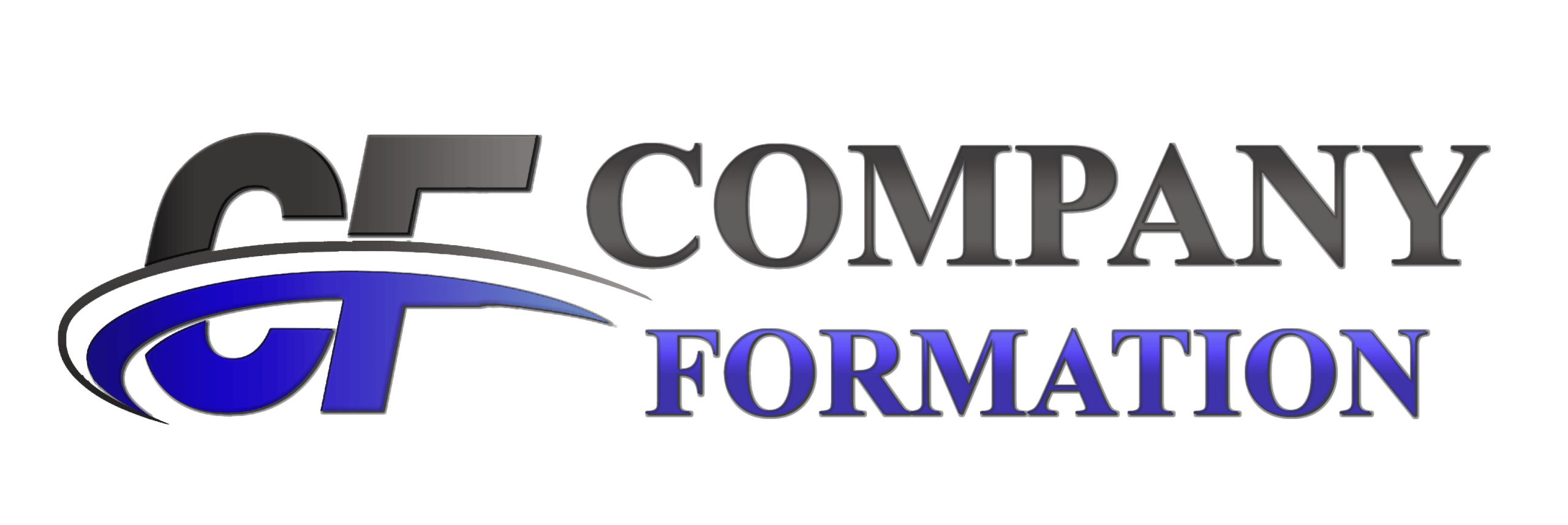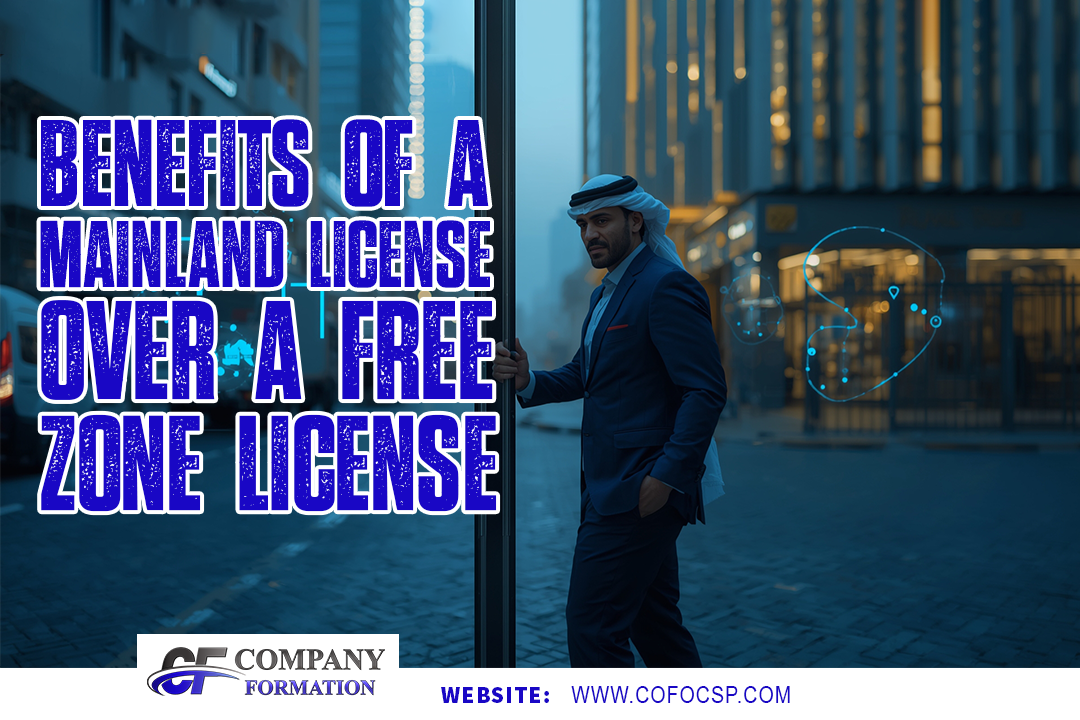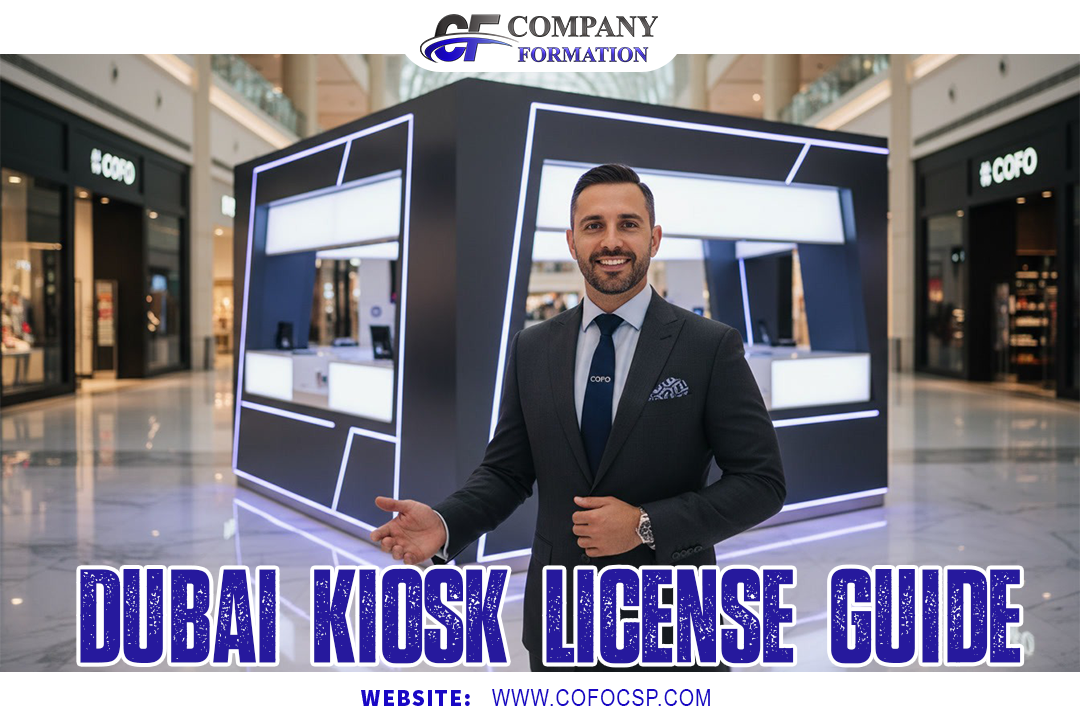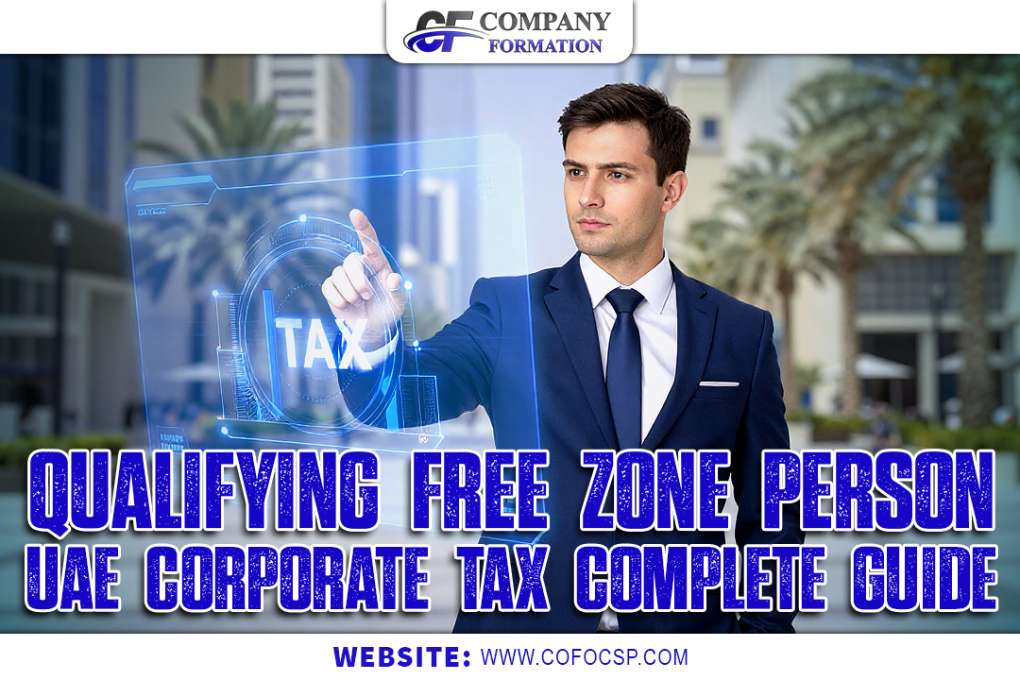Top 5 Benefits of a Mainland License Over a Free Zone License in 2025
Wondering why a mainland license might be better than a free zone license for your UAE business setup in 2025? A mainland license offers unmatched flexibility, allowing you to trade freely across the UAE, access government contracts, and scale without restrictions. Unlike a free zone company, which is limited to specific zones and international markets, a mainland company provides broader market access, visa flexibility, and diverse business activities, especially for industries like e-commerce, retail, and tech. This guide explores the top five benefits of choosing a mainland company over a free zone company, helping you make an informed decision for your business setup in Dubai or beyond.
What Is the Difference Between Mainland and Free Zone in UAE?
When planning your UAE business setup, understanding the difference between a mainland company and a free zone company is crucial. Both options offer unique advantages, but they cater to different business goals. Let’s break it down to help you decide.
Mainland Company: Definition and Key Features
A mainland company is an onshore entity registered with the Department of Economic Development (DED) in an emirate like Dubai or Abu Dhabi. It operates under UAE Commercial Law and enjoys the freedom to conduct business activities anywhere in the UAE and globally.
Key features include:
- 100% foreign ownership in most sectors as of 2025, thanks to Federal Law No. 19 of 2018.
- Ability to trade directly in the UAE market without needing a local agent.
- No restrictions on visa quotas, depending on office space size.
- Mandatory financial audit and compliance with 9% corporate tax on profits exceeding AED 375,000.
Free Zone Company: Definition and Key Features
A free zone company is registered in one of the UAE’s 50+ free zones, such as DMCC or JAFZA, under a Free Zone Authority (FZA). These zones are designed for specific industries like tech, media, or logistics, offering tailored infrastructure.
Key features include:
- 100% foreign ownership with no local sponsor required.
- 0% corporate tax for Qualifying Free Zone Persons meeting specific criteria (e.g., Qualifying Activities).
- Flexi desk or virtual office options, reducing office space requirements.
- Restrictions on trading directly in the UAE market without a local distributor.
Mainland vs Free Zone: A Quick Comparison
| Factor | Mainland | Free Zone |
| Business Scope | Trade anywhere in UAE and globally | Limited to free zone or international |
| Ownership | 100% foreign ownership (most sectors) | 100% foreign ownership |
| Taxation | 9% corporate tax on profits > AED 375,000 | 0% corporate tax (if qualifying) |
| VAT | 5% on taxable supplies | 5% or 0% in designated zones |
| Office Requirements | Minimum 200 sq ft physical office | Flexi desk or virtual office |
| Visa Quotas | Unlimited (based on office size) | Limited (0–6 per license) |
| Setup Timeline | 2–4 weeks | 5 days–2 weeks |
| Regulatory Body | DED, Municipality, MoHRE | Free Zone Authority (e.g., DMCC, JAFZA) |
This comparison highlights why a mainland license often suits businesses needing local market access, while free zone licenses appeal to those prioritizing tax exemptions.
Top 5 Benefits of a Mainland License Over a Free Zone License
Choosing a mainland license in 2025 offers distinct advantages, especially for businesses in e-commerce, retail, and tech. Here are the top five benefits, backed by practical insights to help you plan your business registration in Dubai.
1. Unrestricted Market Access Across the UAE
The biggest advantage of a mainland company is its ability to operate anywhere in the UAE without restrictions. Unlike a free zone company, which is confined to its zone or international markets, a mainland business can directly engage with the UAE market, including local customers in Dubai, Abu Dhabi, or Sharjah.
- Why It Matters: If you’re running a retail store or e-commerce platform, you can sell directly to UAE consumers without needing a local distributor. This cuts costs and simplifies operations.
- Example: Imagine launching a clothing boutique in Dubai. With a mainland license, you can open a shop in a prime location like Dubai Mall and sell to local customers without intermediaries, unlike a free zone company that would need a distributor to access the same market.
- 2025 Update: Recent UAE regulations have streamlined trade license processes, making it easier for mainland companies to expand across emirates.
2. Flexibility in Business Activities
A mainland license provides access to over 2,000 business activities, far more than most free zones, which are often limited to industry-specific options like tech or logistics. This makes mainland ideal for diverse businesses, especially in e-commerce and retail.
- Why It Matters: You can combine multiple activities under one trade license, such as selling products and offering consulting services, without needing separate licenses.
- Example: A tech startup might develop software and offer IT consulting under a single mainland license, while a free zone company in Dubai Internet City might be restricted to tech-related activities only.
- 2025 Update: New regulations allow freelancer mainland licenses for professionals in media or consulting, expanding options for solo entrepreneurs.
3. Unlimited Visa Quotas for Growth
Mainland companies have no fixed limit on visa quotas, unlike free zone companies, which are typically capped at 0–6 visas per license. The number of visas for a mainland business depends on office space size, making it perfect for labor-intensive industries.
- Why It Matters: For retail or tech businesses hiring multiple employees, a mainland license supports growth without visa restrictions.
- Example: A retail chain opening multiple stores in Dubai can secure dozens of employment visas by leasing a larger office, while a free zone company might struggle to hire beyond six staff members.
- Cost Insight: Visa costs for mainland companies are lower, averaging AED 3,000 per visa, compared to AED 4,000–7,000 in free zones, addressing “Difference between employment visa mainland and freezone.”
This benefit is crucial for businesses planning to scale, especially those targeting UAE Golden Visa eligibility for investors and employees.
4. Access to Government Contracts and Tenders
Mainland companies can bid on UAE government contracts and tenders, a lucrative opportunity unavailable to free zone companies. This is a game-changer for businesses in e-commerce, tech, or construction aiming for large-scale projects.
- Why It Matters: Government contracts offer stable revenue and prestige, enhancing your business setup in Dubai.
- Example: A tech firm with a mainland license could secure a contract to develop software for a Dubai government department, while a free zone company would be ineligible without a mainland partner.
- 2025 Update: The UAE business environment in 2025 prioritizes local partnerships, giving mainland companies an edge in public-sector projects.
This addresses the gap of UAE government contracts, a key advantage for ambitious entrepreneurs.
5. Easier Bank Account Setup and Financial Flexibility
Opening a bank account is often smoother for mainland companies, as UAE banks prefer businesses with local market access. This is critical for e-commerce and retail businesses needing robust financial operations.
- Why It Matters: A mainland license signals stability, making it easier to secure corporate accounts with banks like RAKBank or Emirates NBD.
- Example: An e-commerce business processing local transactions can open a bank account with fewer hurdles, while a free zone company may face stricter scrutiny due to its limited business scope.
- 2025 Update: New PRO services streamline business registration in Dubai, including bank account setup, for mainland companies.
This benefit fills the gap of open a bank account, ensuring financial flexibility for growing businesses.
How to Set Up a Mainland Company in Dubai in 2025
Setting up a mainland company in Dubai is straightforward with the right guidance.
Step-by-Step Guide to Mainland Business Registration
- Choose Your Business Activity: Select from over 2,000 activities (e.g., e-commerce, retail, tech). Consult business setup consultants in Dubai to ensure compliance.
- Reserve a Trade Name: Submit your preferred name for trade name approval via the DED portal.
- Obtain Initial Approval: Apply for initial approval from the DED, confirming your business license eligibility.
- Secure Office Space: Lease a minimum 200 sq ft physical office to meet office space requirements.
- Prepare Legal Documents: Draft a Memorandum of Association (MoA) and obtain attestations from the Ministry of Economy.
- Apply for Licenses: Submit documents to the DED for your trade license. Additional approvals from the Municipality or Ministry of Human Resources and Emiratisation (MoHRE) may be needed for specific activities.
- Open a Bank Account: Use your trade license and MoA to open a bank account with a UAE bank.
- Apply for Visas: Secure employment visas based on your office size and Labor Card requirements.
Key Documents and Approximate Costs for 2025
- Documents: Passport copies, MoA, lease agreement, trade name approval, initial approval certificate.
Costs:
- License Fee: AED 20,000–50,000, depending on activity.
- Office Rent: AED 30,000–150,000/year for 200+ sq ft.
- Visa Fees: AED 3,000 per visa.
- Other Fees: AED 5,000–10,000 for attestations and approvals.
- Timeline: 2–4 weeks, faster with PRO services.
Mainland vs Free Zone: Key Considerations for Specific Industries
The choice between a mainland license and a free zone license depends on your industry. Here’s how e-commerce, retail, and tech businesses benefit from mainland setups.
E-commerce: Why Mainland Wins
E-commerce businesses thrive with a mainland license due to direct access to the UAE’s growing online market, valued at $27 billion in 2025 (Statista).
- Benefit: Sell directly to UAE consumers without a local distributor, unlike free zone companies.
- Example: An e-commerce platform selling electronics can partner with local couriers like Aramex and process payments via UAE banks, streamlining operations.
Retail: Tapping Into Local Markets
Retail businesses, such as clothing or food outlets, need a mainland license to operate physical stores in popular areas like Dubai Mall.
- Benefit: Open multiple branches across emirates without restrictions, unlike free zone companies limited to their zones.
- Example: A coffee shop chain can expand to Sharjah and Abu Dhabi, hiring staff with unlimited visa quotas.
Tech: Scaling Without Limits
Tech startups benefit from a mainland license for its flexibility in activities and access to government contracts.
- Benefit: Combine software development, consulting, and training under one trade license, unlike free zones like Dubai Internet City, which focus on tech-specific activities.
- Example: A tech firm can bid on a Dubai Smart City project while serving local clients, a feat free zone companies can’t achieve without mainland approvals.
FAQs About Mainland and Free Zone Licenses in 2025
Q1: What is mainland in UAE?
Mainland means a business registered with the Department of Economic Development (DED) in places like Dubai or Abu Dhabi. A mainland company can trade anywhere in the UAE and also do business worldwide.
Q2: What is the difference between mainland and free zone UAE?
A mainland company can work all over the UAE, hire many people with no visa limits, and pays 9% corporate tax. A free zone company works only inside its free zone, can get tax-free status (0%) if it qualifies, and has limited visas.
Q3: Can a mainland company do business in a free zone?
Yes. A mainland company can work in free zones if it gets the needed approvals. But a free zone company cannot freely work in the mainland—it must hire a local distributor or partner.
Q4: Difference between employment visa mainland and freezone?
Mainland visas are unlimited, cost ~AED 3,000, and depend on office space. Free zone visas are capped at 0–6, cost AED 4,000–7,000, and vary by zone.
Q5: What are the latest 2025 corporate tax rules for mainland and free zone companies?
Mainland companies pay 9% corporate tax on profits above AED 375,000. Free zone companies enjoy 0% corporate tax if they meet Qualifying Free Zone Person criteria, otherwise 9% applies.
Q6: How much does a mainland vs free zone license cost in 2025?
Mainland setup costs range from AED 20,000–50,000 for licenses, plus AED 30,000–150,000 for office rent. Free zone costs range from AED 10,000–50,000, with flexi desk options starting at AED 10,000/year.
Conclusion: Is a Mainland License Right for Your UAE Business?
Getting a mainland license in 2025 gives your business more freedom than a free zone license. With a mainland company, you can sell anywhere in the UAE, do many types of business, get as many visas as you need, join government projects, and open bank accounts more easily. This makes it a great choice for shops, online stores, and tech companies. Free zones are good for tax savings and fast setup, but they limit local trading. If you want to reach UAE customers, a mainland license is the better option. Talk to business setup consultants in Dubai to get started and grow your business in the UAE.







